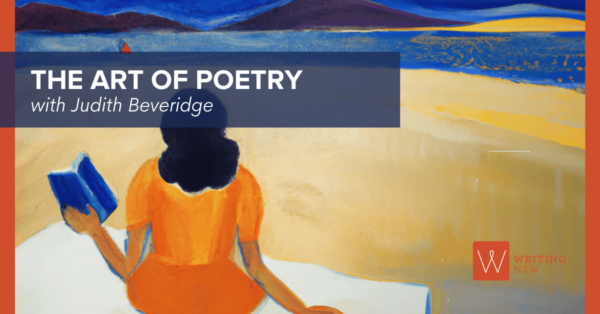Writers on Writing is our regular conversation with a writer or industry professional about the writing craft, industry insights, and their own practice. This week, we spoke to Judith Beveridge about writing, reading and thinking poetry. Judith shares some insights and tells us what drew her to poetry in the first place.
What drew you to the poetry as a form?
A love of language, the fact that you can say things in poetry that are often less powerful when said in prose – the concision and intensity of poetic language enables more to be said with little. I also love the fact that poetry is language at it’s most musical and beguiling, and also at it’s most truthful. Poetry can be intensely emotional, and it can reveal truths in ways that avoid the discursive. It is perhaps the lyric, with its unique characteristics of brevity, musicality, concentration of thought and emotion in a formalised way, which best exemplifies a poem’s ability to reverberate and animate consciousness, to bring us into connection with the inner life.
How do you define poetry?
Poetry has many different forms and poets approach poetry in different ways, just as musicians and painters vary in the ways in which they approach their art forms. Jane Hirshfield in her book Nine Gates: Entering the Mind of Poetry says: ‘Every good poem begins in language awake to its own connections – language that hears itself and what is around it.’ I love that expression: ‘language which hears itself’, for only in poetry do we encounter language which is so awake to its potentiality, to its inherent ability to be moving and memorable. For myself, the ‘how’ of the poem is just as important, perhaps even more so, than the ‘what’. Seamus Heaney called this ‘the erotics of language’.
Are there any misconceptions when it comes to poetry?
Yes plenty: that it is hard, out-dated, incomprehensible, relevant only to an elite audience, or that anyone can be a poet if they have something to say. All this is rubbish of course, as there are so many different types of poetry – from the obstruse to the sentimental. But the best poetry quickens and heightens our sense of language to the point where we participate most potently in meaning-making. The aesthetic demands of the poem provide a wonderful way for us to process our thoughts and feelings. Something transformative occurs when the poet, through exploration and invention, discovers those sounds, images and rhythms which open and reveal a unique set of meanings. The poetic imagination makes the world sensible, both literally and figuratively. The art of poetry is a lifetime’s dedication, requiring discipline and commitment.
Have there been any works of poetry you’ve read recently that have made a lasting impression on you?
I’m currently reading The Collected Poems of Eiléan Ní Chuilleanáin, an Irish poet with a very strange and haunting imagination. Recent books by Australian poets I have been impressed by are The Singer and Other Poems by Kim Cheng Boey, Neckau by Rico Craig, Slack Tide by Sarah Day, The Jaguar by Sarah Holland-Batt, Ordinary Time by Anthony Lawrence and Audrey Molloy, and Non-essential Work by Omar Sakr.
Judith Beveridge is the author of seven collections of poetry, most recently Sun Music: New and Selected Poems which won the 2019 Prime Minister’s poetry prize. She has taught poetry in schools and Universities and in the public domain and was poetry editor for Meanjn 2005-2015.

If you want to be the first to read great advice, prompts and inspiration from our incredible tutors, subscribe to our weekly e-newsletter Newsbite.
More from Writing NSW
Check out our full range of writing courses in Sydney, our online writing courses and our feedback programs to see how we can help you on your creative writing journey. Find out about our grants and prizes, as well as writing groups across NSW, and sign up to our weekly newsletter for writing events, opportunities and giveaways.
